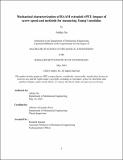Mechanical characterization of BAAM extruded rPET: impact of screw speed and methods for measuring Young’s modulus
Author(s)
Su, Ashley
DownloadThesis PDF (7.994Mb)
Advisor
Perez, Alfonso Alexander
Terms of use
Metadata
Show full item recordAbstract
The issue of plastic waste and recycling has reached critical proportions in recent years, exacerbated by the rapid growth in plastic production and consumption. Polyethylene terephthalate (PET), a commonly used plastic, presents particular challenges due to its widespread application in various industries, ranging from food and liquid packaging to electronics and automotive parts. Despite its versatility, PET's non-biodegradable nature contributes significantly to environmental pollution, with a substantial portion ending up in landfills or the natural environment. Current recycling methods, while essential, face limitations in effectively managing PET waste, with only a fraction of it actually being recycled. As a result, there is an urgent need for innovative recycling techniques and sustainable solutions to address the escalating problem of PET waste and its environmental impact.
This paper investigates the mechanical properties of recycled polyethylene terephthalate (rPET) samples extruded using the Big Area Additive Manufacturing (BAAM) system at two different screw speeds: 90 and 115 rpm. Two distinct test methods, a simplified three-point bending test and uniaxial tensile test, were utilized to determine the Young’s modulus of the samples. The results indicate that the Young’s modulus of the samples extruded at 90 rpm was consistently greater than those extruded at 115 rpm for both test methods. This suggests that screw speed, as a parameter in the extrusion process, influences the mechanical properties of rPET. Additionally, the study highlights the need for further investigation into the interchangeability of the two test methods. Future research recommendations include exploring methods to encourage consistency in extrusion, such as utilizing moisture analyzers, and investigating the mechanical behavior of rPET when blended with contaminants.
Date issued
2024-05Department
Massachusetts Institute of Technology. Department of Mechanical EngineeringPublisher
Massachusetts Institute of Technology